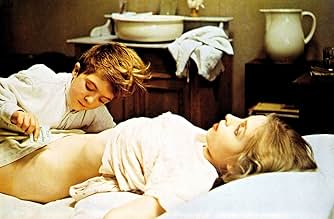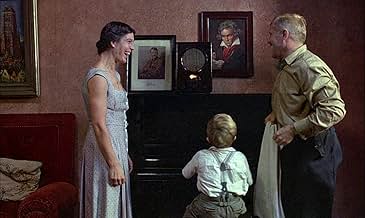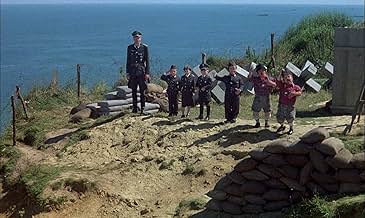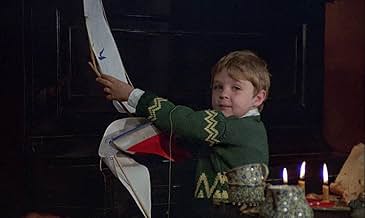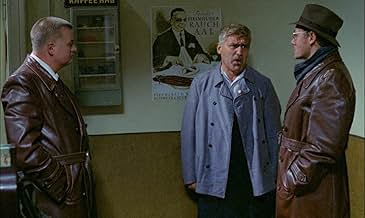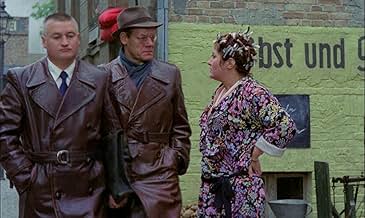ऑस्कर अपने तीसरे जन्मदिन पर कभी बड़ा न होने की कसम खाता है. डेंजिग में नाजियों के सत्ता में आने के बाद, ऑस्कर खुदको एक बच्चा बने रहने के लिए तैयार करता है, अपने टिन ड्रम को लगातार पीटता है औ... सभी पढ़ेंऑस्कर अपने तीसरे जन्मदिन पर कभी बड़ा न होने की कसम खाता है. डेंजिग में नाजियों के सत्ता में आने के बाद, ऑस्कर खुदको एक बच्चा बने रहने के लिए तैयार करता है, अपने टिन ड्रम को लगातार पीटता है और अपने आसपास की अराजकता के विरोध में चिल्लाता है.ऑस्कर अपने तीसरे जन्मदिन पर कभी बड़ा न होने की कसम खाता है. डेंजिग में नाजियों के सत्ता में आने के बाद, ऑस्कर खुदको एक बच्चा बने रहने के लिए तैयार करता है, अपने टिन ड्रम को लगातार पीटता है और अपने आसपास की अराजकता के विरोध में चिल्लाता है.
- 1 ऑस्कर जीते
- 18 जीत और कुल 6 नामांकन
- Lina Greff
- (as Andréa Ferreol)
- Der Alte Heilandt
- (as Helmuth Brasch)
फ़ीचर्ड समीक्षाएं
The film is filled with moral ethics and symbolism. The tin drum Oscar always drums on is a symbol of his protest against the cruelty that grown ups create, not to mention the rise of Nazism. Die Blechtrommel even has large scenes that are only for symbolism. It is probably one of the most important German films since WW2. Somehow, the German make the best films that decipher Nazism and WW2 (like Stalingrad and the new Der Untergang) which very clearly shows their self awareness. I think Die Blechtrommel is one of the finest examples of this.
It is often quite absurd this film, one of the most memorable scenes is when Oscar watches a Nazi rally. As an officer is marching through the crowd, the orchestra is playing a march. Oscar starts playing his drum, and make all the musicians play false, and after a while they all start to play "An der Schönen blauen Donau" and the crowd starts to dance.
Die Blechtrommel is one of the most memorable films ever, whet ever you liked it or not. Some scenes are very sick, and i do not encourage people who don't have a stomach for strong films to see this. For other film lovers though, this is one of the greatest films ever.
The Tin Drum is based on Gunter Grass's highly acclaimed novel which used magic realism to capture the madness of war, and the folly of the people who made it possible. This movie only tackles the first two sections of the novel, leaving out the post-war events. The film won the Academy Award for Best Foreign film in 1980, and the Palm d'Or at Cannes. It was also banned in Oklahoma as "child pornography". Despite moments of brilliance, The Tin Drum left me feeling incomplete and curiously unmoved.
It is a very different kind of film from the others I saw this week, using satire and surrealism to explore people's reactions during the period from 1939 to 1945. It seems to be saying that it is all right to stop growing (that is, participating in the world) as a protest against the cynicism and corruption of the adult world. The setting for the majority of the film, Danzig (now Gdansk) is a major northern port town in Poland. Danzig was a free and independent city until September 1, 1939, when it became the first region taken by Germany at the outset of WWII. After the war, Danzig became a part of Poland again.
The Tin Drum is the story of Oskar Matzerath, a boy who grows up in Eastern Germany before and during World War II. Oskar decides the only way to protest being part of the adult world is by banging on his drum and remaining a child forever. This is his rebuttal of society and his tin drum is his protest against the mentality of his family and neighborhood, or perhaps against all passive people in Nazi Germany at that time. Oskar tries to shock the world out of its inhumanity. His life reflects Germany's struggle to free itself from its own dream of Teutonic superiority and find peace in the national soul.
David Bennent as Oskar gives an outstanding performance, creating a character that is both haunting and frightening. He looks like a little man in a child's body but his eyes are deep and have a very knowing look that seemed to be looking right through me.
Oskar is not a cute little updated version of Peter Pan. Since age three (when he was given his first tin drum), Oskar can scream with such a high pitch that he can shatter any piece of glass. He even controls his scream to the point where he can break windows on the other side of the city, or etch writing into glass. Oskar uses his ability to manipulate and control the adult world, often using vicious and cynical snide comments about the insanity around him. At one point, he disrupts a Nazi rally by changing the beat of his tin drum to the Blue Danube which the band then follows. The ensuing scene where the crowd breaks into a dance and the rain comes down leaving the Nazi soldiers bewildered is one of the best in the film.
I found the scenes where Oskar joins a midget troupe and finds loving companions of his own kind to be very tender and moving. However, the film became morally ambiguous for me when Oskar and his troupe decide to entertain the Nazi soldiers at the front lines. Schlondorff never really makes it clear what his motivations are and Oskar's actions seems to contradict his essentially anarchist protest for most of the film. The Tin Drum also contains some objectionable scenes of childhood sexuality and grotesque depictions of slithering eels being caught using a severed horse head as bait. The result, needless to say, is stomach churning.
I found The Tin Drum to be absorbing and thought provoking yet, despite moments of brilliance, for me it did not add up to a totally satisfying experience.
Goodness, what a marvel this film is! It is certainly the greatest film from Germany that I have seen yet. Winner of the 1979 Academy Award for Best Foreign Language Film, "The Tin Drum" follows the life of a boy named Oskar. After seeing how ludicrous adults act, Oskar decides to stop his growth, and stay three years old forever by falling down the stairs. He succeeds, and the fall has stopped his growth. Aside from the hault of growth, the fall eqips him with two special powers that he regularly manifests. The lesser of these two powers, is repeatedly pounding his tin drum, which he absolutely refuses to let go of. Oskar's undeniable power is to let out a high pitched shriek that will shatter any glass he directs it at. Does it sound strange? Well, the film is much stranger, but also much more beautiful than my description.
The film follows our little Oscar over a period of around two decades, through World War II in Germany. We follow Oskar through his many sexual, emotional, tragic, funny, and beautiful exploits. An absolutely important credit must be given to actor David Bennett, who plays young Oskar. He portrays Oskar as an infant, as a three year-old, as a six year-old, as a twelve year-old, as a 16 year-old, as a 21 year-old...well, you get the picture. Bennett was only 11 at the time, and his performance is very impressive.
I haven't seen very many German films from the last thirty years, but most of the ones I have seen (the excellent "Vanishing," and the immensely mediocre "White Rose") haven't had very good scores. "The Tin Drum" has a very slight, but very servicable, score by the famous Maurice Jarre. The score has an emotional theme played in only a few scenes (notably, the ending), it also has an innocent little music box theme, and surprisingly a cool waltz for scenes involving members of the circus (a big part of the second-half of the film). A very good score. To my knowledge, it was released on LP when the film was released, and on a CD pressed in Japan sometime in the 90's. I read that the (sadly out of print) Kino DVD includes the isolated score as an extra.
It's an excellent film that I strongly connected with, but I can see many people not liking it, it is VERY strange, but I am somebody who has always found VERY strange things extremely beautiful, and "The Tin Drum" is no exception. Over-all, I consider this film a classic, and I'll once again state that it is certainly the greatest film from Germany that I have seen yet.
Things I saw in this movie that vividly stuck in my brain are such things as a huge eel being pulled out of a severed horses head that was just dragged from the sea on a rope, a soldier having carnal knowledge with a lady in the middle of a field while being hunted by another soldier, a young boy spitting into a hand of a young girl ...
And I could go on. This movie I found to be extremely unique and varied in many ways. I don't know that I can really recommend this movie all in all, but if you do watch it, be prepared for a very unique experience film wise.
Beamer
क्या आपको पता है
- ट्रिवियाDavid Bennent has a condition which caused him to grow very slowly. When he appeared in this film at age 11, he was 1.14 meters (3 ft. 9' in.) tall. He continued to grow to 1.55 m (5 ft. 1 in), and was still growing well into his thirties.
- गूफ़While the German soldiers attack the Polish post office, one fires an MG42 machine gun from his shoulder. The German army didn't use that weapon before 1942. It's also not supposed to be fired while standing.
- भाव
Oskar Matzerath: There once was a drummer. His name was Oskar. He lost his poor mama, who had eat to much fish. There was once a credulous people... who believed in Santa Claus. But Santa Claus was really... the gas man! There was once a toy merchant. His name was Sigismund Markus... and he sold tin drums lacquered red and white. There was once a drummer. His name was Oskar. There was once a toy merchant... whose name was Markus... and he took all the toys in the world away with him.
- इसके अलावा अन्य वर्जनAlthough reluctant to do so the BBFC were forced to remove 19 secs from UK cinema and video versions under the Protection of Children Act to remove a scene showing Oskar pressing his face against Maria's pubic region. The cuts were waived in 2003 when it was decided that the scene did not constitute an indecent image.
- कनेक्शनFeatured in Pieces of Silver (1989)
टॉप पसंद
विवरण
- रिलीज़ की तारीख़
- कंट्री ऑफ़ ओरिजिन
- आधिकारिक साइट
- भाषाएं
- इस रूप में भी जाना जाता है
- Die Blechtrommel
- फ़िल्माने की जगहें
- उत्पादन कंपनियां
- IMDbPro पर और कंपनी क्रेडिट देखें
बॉक्स ऑफ़िस
- दुनिया भर में सकल
- $7,469
- चलने की अवधि2 घंटे 22 मिनट
- रंग
इस पेज में योगदान दें



